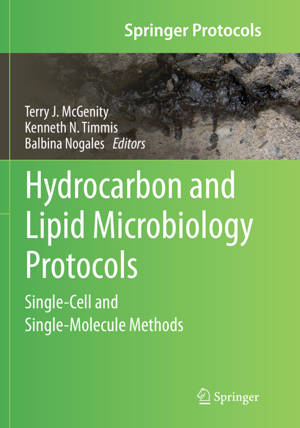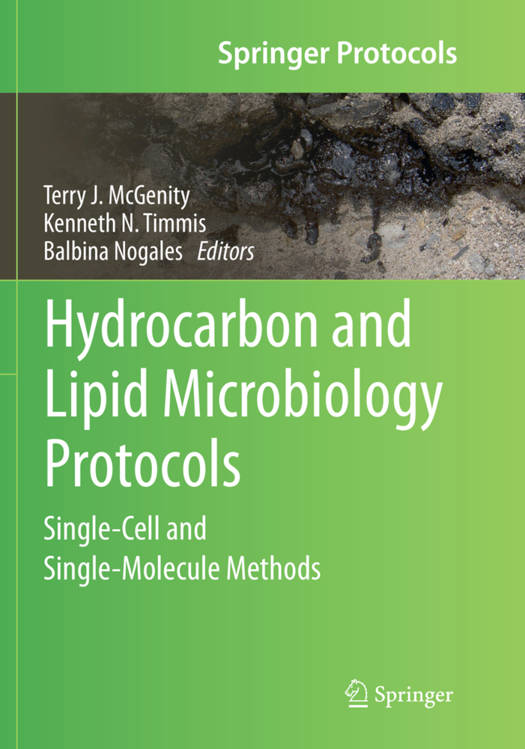
- Retrait gratuit dans votre magasin Club
- 7.000.000 titres dans notre catalogue
- Payer en toute sécurité
- Toujours un magasin près de chez vous
- Retrait gratuit dans votre magasin Club
- 7.000.0000 titres dans notre catalogue
- Payer en toute sécurité
- Toujours un magasin près de chez vous
Hydrocarbon and Lipid Microbiology Protocols
Single-Cell and Single-Molecule Methods
167,95 €
+ 335 points
Description
This Volume presents relevant single-cell and single-molecule approaches in the study of microbes producing and utilizing hydrocarbons and lipids. While generically applicable for all microorganisms, the approaches described are, wherever possible, adapted to the field of study of hydrocarbon and lipid microbiology. The methods include basic procedures for isolating single cells by means of microfluidics and flow cytometry, and their cultivation in arrays as pure clones; for isolating, amplifying and sequencing single-cell genomes and transcriptomes; and for analysing single-cell metabolomes by means of Raman spectroscopy. Single-molecule approaches include the use of protein: fluorescent dye fusions for protein localization and methods for the production of cell division protostructures and lipid monolayers. Methods for the functional analysis of single cells include detection of metabolically active (protein-synthesizing) cells in environmental samples by bioorthogonal non-canonical amino acid tagging, Raman spectroscopy combined with stable isotope labelling and fluorescent in situ hybridisation, and visualization of single cells participating in gene transfer activity. Lastly, protocols are presented for single-cell biotechnological applications, including biofuel production.
Hydrocarbon and Lipid Microbiology ProtocolsThere are tens of thousands of structurally different hydrocarbons, hydrocarbon derivatives and lipids, and a wide array of these molecules are required for cells to function. The global hydrocarbon cycle, which is largely driven by microorganisms, has a major impact on our environment and climate. Microbes are responsible for cleaning up the environmental pollution caused by the exploitation of hydrocarbon reservoirs and will also be pivotal in reducing our reliance on fossil fuels by providing biofuels, plastics and industrial chemicals. Gaining an understanding of the relevant functions of the wide range of microbes that produce, consume and modify hydrocarbons and related compounds will be key to responding to these challenges. This comprehensive collection of current and emerging protocols will facilitate acquisition of this understanding and exploitation of useful activities of such microbes.
Hydrocarbon and Lipid Microbiology ProtocolsThere are tens of thousands of structurally different hydrocarbons, hydrocarbon derivatives and lipids, and a wide array of these molecules are required for cells to function. The global hydrocarbon cycle, which is largely driven by microorganisms, has a major impact on our environment and climate. Microbes are responsible for cleaning up the environmental pollution caused by the exploitation of hydrocarbon reservoirs and will also be pivotal in reducing our reliance on fossil fuels by providing biofuels, plastics and industrial chemicals. Gaining an understanding of the relevant functions of the wide range of microbes that produce, consume and modify hydrocarbons and related compounds will be key to responding to these challenges. This comprehensive collection of current and emerging protocols will facilitate acquisition of this understanding and exploitation of useful activities of such microbes.
Spécifications
Parties prenantes
- Editeur:
Contenu
- Nombre de pages :
- 204
- Langue:
- Anglais
- Collection :
Caractéristiques
- EAN:
- 9783662569825
- Date de parution :
- 22-04-18
- Format:
- Livre broché
- Format numérique:
- Trade paperback (VS)
- Dimensions :
- 178 mm x 254 mm
- Poids :
- 381 g

Les avis
Nous publions uniquement les avis qui respectent les conditions requises. Consultez nos conditions pour les avis.





